|
|
|
Sort Order |
|
|
|
Items / Page
|
|
|
|
|
|
|
| Srl | Item |
| 1 |
ID:
124314
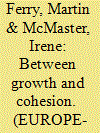

|
|
|
|
|
| Publication |
2013.
|
| Summary/Abstract |
THE ISSUE OF REGIONAL DEVELOPMENT IS HIGH ON THE POLICY agenda in Central and Eastern Europe (CEE). Indeed, for a variety of reasons, these countries are currently seen as some of the most interesting 'laboratories' for regional development in the European Union (EU) and beyond. First, from a situation in the early and mid-1990s where ?nances for regional development in these countries were very limited, there are now signi?cant levels of funding available. These ?nances ?ow predominantly from the structural funds available under EU cohesion policy, of which CEE member states are the biggest bene?ciaries in the EU. As the contribution by Ferry and McMaster notes, this brings with it opportunities to expand the scope and impact of regional development interventions. However, it also puts pressure on regional policy systems in these countries to develop structures and processes to absorb the funds, to ensure that they contribute to strategic economic growth, and to maintain a clear vision for domestic regional development.
|
|
|
|
|
|
|
|
|
|
|
|
|
|
|
|
| 2 |
ID:
072976
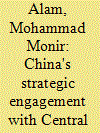

|
|
|
| 3 |
ID:
132711
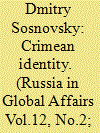

|
|
|
|
|
| Publication |
2014.
|
| Summary/Abstract |
Kiev's attempt to build an all-Ukrainian identity solely on the basis of the Ukrainian ethnos through political centralization, cultural unification, and forceful assimilation was a complete failure. Now, as part of the Russian Federation, which pursues an entirely different regional policy, Crimea has an opportunity to form its own regional identity.
|
|
|
|
|
|
|
|
|
|
|
|
|
|
|
|
| 4 |
ID:
163423


|
|
|
|
|
| Summary/Abstract |
This article investigates EU–China dialogue on regional policy, a puzzling exercise in policy transfer because such policy is by its nature inward-oriented and the intricacies of regional development imply uncertainty about its effects in different contexts. The article sheds light on the reasons of both sides for engaging in this unlikely policy learning effort and identifies its actors and mechanisms. It also critically assesses this process, stressing its one-way nature and the active role of the EU as a ‘policy-sender’, in contrast to most policy transfer literature citing demands by the policy-recipient as the predominant reason to engage in such cooperation.
|
|
|
|
|
|
|
|
|
|
|
|
|
|
|
|
| 5 |
ID:
089821
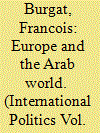

|
|
|
|
|
| Publication |
2009.
|
| Summary/Abstract |
Can the European Union (EU) secure the confidence of the Middle Eastern masses while being perceived as the ally and accomplice of two main adversaries of the Arab population, namely the Israeli state and the authoritarian Arab regimes, which are rightly accused to be violating international law and the same principles of good governance that the EU is purportedly promoting in the Middle East? Europe's inaccurate identification of suitable partners, within Arab civil society or opposition movements, and, most notably, its chronic inability in establishing meaningful relations with the emerging generation of moderate Islamic actors, has impacted negatively upon the EU's image in the Middle East, diminishing significantly the effectiveness of its regional policies.
|
|
|
|
|
|
|
|
|
|
|
|
|
|
|
|
| 6 |
ID:
131030
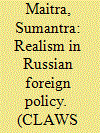

|
|
|
|
|
| Publication |
2014.
|
| Summary/Abstract |
The Crimean crisis marks a pivotal point in the rations between Russia and the West. The revolution in Ukraine, and the subsequent events that unfolded at breakneck pace, including the annexation of Crimea by Russia, throws up a lot of questions, the answers to which will have a massive impact on foreign policy and inter-state relations in the future. It also throws up some broad patterns. The crisis is a worrying return to a trend of land annexation by a great power on a pretext, a trend which was thought to be long dead Munich Conference of 2007. It brings back the debate on the concepts of "Perception and Resolve" in foreign policy. And, perhaps, most importantly, it serves as a vindication of realists over the liberals, constructivists and other paradigms of international relations, and validates the often discussed idea that state interests triumph over every other aspect.
|
|
|
|
|
|
|
|
|
|
|
|
|
|
|
|
| 7 |
ID:
132693


|
|
|
|
|
| Publication |
2014.
|
| Summary/Abstract |
This study looks at the potential competitiveness of the emerging biomass-based biofuel industry in the current economic environment. A simulation model suggests that a mature biomassbased biofuel industry is potentially competitive with gasoline, and capable of filling a significant fraction of motor fuel supplies. However, the existing land policy has a narrow definition of agricultural land for a biomass-based fuel industry. A broader definition of agricultural land suitable for biomass inputs would reduce biofuel processing costs, relieve the food versus fuel conflict, and increase the net gain to fuel consumers, food consumers, and producers of food and fuel.
|
|
|
|
|
|
|
|
|
|
|
|
|
|
|
|
| 8 |
ID:
131453
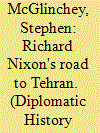

|
|
|
|
|
| Publication |
2013.
|
| Summary/Abstract |
By the time of Richard Nixon's arrival in office Iran had already become America's single largest arms purchaser. This was the result of an evolutionary process that had been underway for two decades. Nixon did not just change that evolutionary pattern of arms sales with Iran, he completely revised U.S. thinking on Iran's regional role. By the end of his first term in office, Nixon had leveraged U.S. Middle Eastern regional policy primarily around the focal point of a militarily strong, pro-U.S. Iran. In concert, the shah was encouraged to begin an unprecedented military spending spree. Consequently, in mid-1972 following a meeting of the two leaders in Tehran, Iranian annual purchases went, virtually overnight, from being measured in the tens of millions to being measured in the multi-billions. Tracing the complex evolution toward that meeting, and the accompanying policy shifts, form an underappreciated part of Cold War history.
|
|
|
|
|
|
|
|
|
|
|
|
|
|
|
|
| 9 |
ID:
123898


|
|
|
|
|
| Publication |
2013.
|
| Summary/Abstract |
CURRENTLY in a number of capitals in the Asia Pacific region, especially Beijing and Tokyo, passions are running high along with bellicose rhetoric and a relentless drumbeat. Politicians and the military compete in patriotism, fueling nationalism. A fresh example: the ASEAN nations have reacted rather nervously to the regional policy of China, which has recently begun issuing new passports that show a disputed map of the South China Sea (SCS). Beijing has also approved a new regulation which gives the Navy's leadership a greater scope of freedom to detain foreign vessels traveling in the waters that China claims as its own.1 According to The New York Times, "China has perturbed India, Vietnam and Japan with its more assertive line on longstanding territorial disputes."2 Therefore the theme of conflicts in East Asia persists in the pages of the international media and provides constant occasion for news coverage, stoking the fears of the international community about the state of affairs in one of the key regions of the world.
|
|
|
|
|
|
|
|
|
|
|
|
|
|
|
|
| 10 |
ID:
164725
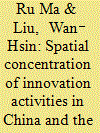

|
|
|
|
|
| Summary/Abstract |
This paper analyzes the development of spatial concentration of various innovation activities in China from 2000 to 2015 by using a generalized Theil index based on a balanced provincial dataset. It tracks concentration development back to the developing heterogeneity within and between regions in general and the mega‐economic zones in particular. Results show that innovation activities tend to be distributed unequally across provinces in China, with more pronounced unequal distribution of innovation outcomes than innovation inputs. Over the research period, the innovation activities considered became more and more equally distributed across provinces. The between‐region inequality of innovation activities has, however, not yet significantly improved, despite the implementation of Chinese regional policies to encourage more equal regional development. Instead, more equal distribution of innovation activities within mega‐economic zones is observed.
|
|
|
|
|
|
|
|
|
|
|
|
|
|
|
|
| 11 |
ID:
133529
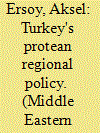

|
|
|
|
|
| Publication |
2014.
|
| Summary/Abstract |
How has regional planning been transformed in increasingly changing socio-economic and political contexts in transition economies? Why do regional planning policies and practices change? This paper explains how the policy ideas of regional development have been formulated and incorporated into the Turkish context since the establishment of modern-day Turkey in 1923. The transformation process shows how, in one way or another, policy ideas have been brought into or appeared in Turkey to shape regional policy. It emphasizes that this sort of acquisition of thinking has been translated into policy frameworks. In other words, Turkey has been taking on policies that have been devised using ideas from outside Turkey which are being dominated by growth-oriented strategies that represent a neoliberal political agenda.
|
|
|
|
|
|
|
|
|
|
|
|
|
|
|
|
| 12 |
ID:
138218
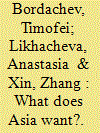

|
|
|
|
|
| Summary/Abstract |
Over the years since the 1998 crisis, the so-called Emerging and Developing Asia has become a new engine of global economic growth. The region has been developing under the slogan "Asia for the world," and the world has been looking for opportunities that it could draw from the Asian economic miracle. Today we are witnessing a profound transformation of the existing model: almost all countries in the region are becoming more Asiacentric, and a new model is emerging that can be called "Asia for Asia." It seems to be a perfect time to ask: What does Asia want? And does this mean that Asian economies will be able to catch up with the best standards of quality that the local growing consumerist class is looking for?
|
|
|
|
|
|
|
|
|
|
|
|
|
|
|
|
|
|
|
|
|